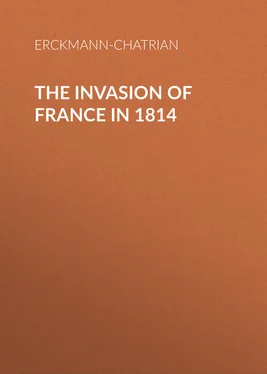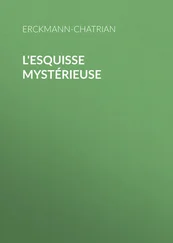Erckmann-Chatrian - The Invasion of France in 1814
Здесь есть возможность читать онлайн «Erckmann-Chatrian - The Invasion of France in 1814» — ознакомительный отрывок электронной книги совершенно бесплатно, а после прочтения отрывка купить полную версию. В некоторых случаях можно слушать аудио, скачать через торрент в формате fb2 и присутствует краткое содержание. Жанр: foreign_antique, foreign_prose, Историческая проза, на английском языке. Описание произведения, (предисловие) а так же отзывы посетителей доступны на портале библиотеки ЛибКат.
- Название:The Invasion of France in 1814
- Автор:
- Жанр:
- Год:неизвестен
- ISBN:нет данных
- Рейтинг книги:3 / 5. Голосов: 1
-
Избранное:Добавить в избранное
- Отзывы:
-
Ваша оценка:
- 60
- 1
- 2
- 3
- 4
- 5
The Invasion of France in 1814: краткое содержание, описание и аннотация
Предлагаем к чтению аннотацию, описание, краткое содержание или предисловие (зависит от того, что написал сам автор книги «The Invasion of France in 1814»). Если вы не нашли необходимую информацию о книге — напишите в комментариях, мы постараемся отыскать её.
The Invasion of France in 1814 — читать онлайн ознакомительный отрывок
Ниже представлен текст книги, разбитый по страницам. Система сохранения места последней прочитанной страницы, позволяет с удобством читать онлайн бесплатно книгу «The Invasion of France in 1814», без необходимости каждый раз заново искать на чём Вы остановились. Поставьте закладку, и сможете в любой момент перейти на страницу, на которой закончили чтение.
Интервал:
Закладка:
"You do not comprehend these things," said she, in a calm, grave voice; "you have never had any of those ideas."
"Then you believe all that Yégof has said to you?"
"Yes, I believe it."
"What, you, Catherine? – you, a sensible woman? If it were the mother of Rochart I should say nothing; but you!"
He rose as though annoyed, took off his apron, shrugged his shoulders, then sat down again quickly, and called out: – "This madman, do you know what he is? I will tell you. He is most assuredly one of those German school-masters who stuff their brains with 'Old Mother Goose' tales, and then gravely relate them to others. By dint of studying, dreaming, ruminating, their wits get out of order; they have visions, many-sided ideas, and take their dreams for realities. I have always looked upon Yégof as one of those poor wretches. He knows lots of names, he speaks of Brittany and Australasia, of Polynesia and the Nideck, and then of Géroldseck, of the Turkestein, of the Rhine – in fact of everything at hazard; and it ends by having the appearance of something when it is nothing. In ordinary times you would think as I do, Catherine; but you are troubled at not receiving any tidings from Gaspard. These rumors of war and of invasion that are going about torment and unsettle you. You cannot sleep; and what a poor madman says, you regard as Bible truths."
"No, Hullin; it is not that. If you yourself had heard Yégof – "
"Get along!" exclaimed the good old fellow. "If I had, I should have laughed at him as I did just now. Do you know that he came to ask Louise of me in marriage, to make her queen of Australasia?"
Catherine Lefèvre could not restrain a smile; but, regaining almost at once her serious expression – "All your reasonings, Jean-Claude," said she, "cannot convince me; but, I confess it, the silence of Gasper frightens me. I know my son: he would certainly have written to me. Why have his letters never reached me? The war is going on badly, Hullin – we have all the world against us. They don't want our revolution – you know it as well as I do. So long as we were masters, and won victory after victory, they looked kindly on us; but since our Russian misfortunes, things wear a bad aspect."
"Là, Là, Catherine, how you get carried away. You see everything gloomily."
"Yes, I see everything gloomily, and I am right. What makes me so uneasy is, that we never get any news from the outer world; we live here as in a savage country: one knows of nothing that goes on. The Austrians and the Cossacks could be upon us at any time, and we should be taken by surprise."
Hullin observed the old dame, whose expression was very animated; and even he began to be influenced by the same fears.
"Listen, Catherine," said he, suddenly. "When you speak in a reasonable manner, it is not I who would say anything against it. All you now tell me is possible. I do not believe in it; but one might as well make sure. I had intended to go to Phalsbourg in a week, to buy sheepskins for trimming some shoes: I will go to-morrow. At Phalsbourg, a garrison and post town, there must be some reliable news. Will you believe those I shall bring you on my return from that place?"
"Yes."
"Good; it is then arranged. I shall leave to-morrow early. There are five leagues in all. I shall return about six o'clock. You will see, Catherine, that all your dismal ideas have no sense in them."
"I hope so," she replied, rising. "I hope so. You have somewhat reassured me, Hullin. Now I will go to the farm, and may I sleep better than I did last night. Good-night, Jean-Claude."
CHAPTER III
AT PHALSBOURG
The next day at dawn, Hullin, wearing his blue cloth Sunday breeches, his large brown velvet jacket and red waistcoat with brass buttons, and a broad beaver mountaineer's hat turned up like a cockade above his ruddy face – started on his way to Phalsbourg, a stout stick in his hand.
Phalsbourg is a small fortress, half-way on the imperial road from Strasbourg to Paris; it dominates Saverne, the defiles of Haut-Barr, Roche-Platte, Bonne-Fontaine, and of the Graufthâl. Its bastions, outposts, and demilunes are cut out in zig-zags on a rocky plain: from afar, the walls look as though they might be cleared at a jump; but on coming closer one perceives the moat, a hundred feet wide, thirty deep, and the dark ramparts hewn in the face of the rock. That makes one stop suddenly. Besides, with the exception of the church, the town-hall, the two gateways of France and Germany, in shape of mitres, and the peaks of the two powder-magazines, all the rest is hidden behind the fortifications. Such is Phalsbourg, which is not without a certain imposing effect, especially when one crosses its bridges and piers, under its thick gates, garnished with iron-spiked portcullis. In the interior, the houses are distributed in regular quarters; they are low, in straight lines, built of freestone: everything bears a military aspect.
Hullin, owing to his robust constitution and jovial disposition, never had any fears for the future, and considered all rumors of retreat, rout, and invasion, which circulated in the country, as so many lies propagated by dishonest individuals; so that one may judge of his stupefaction when, on leaving the mountains and from the outskirts of the woods, he saw the whole surroundings of the town laid as bare as a pontoon: not a garden, not an orchard, not a promenade, or a tree, or even a shrub – all was destroyed within cannon-range. A few poor creatures were picking up the last remnants of their little houses, and carrying them into the town. Nothing was to be seen on the horizon but the line of ramparts standing out clearly above the hidden roads. It had the effect of a thunder-bolt on Jean-Claude.
For some moments he could neither articulate a word nor make a step forward.
"Oh, ho!" said he, at last, "this is bad – this is very bad. They expect the enemy."
Then his warlike instincts prevailed; a dark flush came over his brown cheeks. "It is those rascally Austrians, Prussians, and Russians, and all the other wretches picked up out of the dregs of Europe, who are the cause of this," cried he, waving his stick. "But beware! we will make them pay for the damages!"
He was possessed with one of those white rages such as honest people feel when they are driven to extremities. Woe to him who annoyed Hullin just then!
Twenty minutes later he entered the town, at the rear of a long file of carriages, each harnessed to five or six horses, pulling, with much trouble, enormous trunks of trees, destined to construct block-houses on the place-d'armes . Among the conductors, the peasants, and neighing, stamping horses, marched gravely a mounted gendarme – Father Kels – who did not seem to hear anything, and said, in a rough voice, "Courage, courage, my friends! We will make two more journeys before evening. You will have deserved well of your country!"
Jean-Claude crossed the bridge.
A new spectacle opened before him in the town. There reigned the ardor of defence: all the doors were open; men, women, and children came and ran, helping to transport the powder and projectiles. They stopped in groups of three, four, six, to make themselves acquainted with the news.
"Hé neighbor!"
"What then?"
"A courier has just arrived in great speed. He entered by the French gate."
"Then he has come to announce the National Guard from Nancy."
"Or, perhaps, a convoy from Metz."
"You are right. We want sixteen-pounders, and shot also. The stoves are to be broken up to make some."
A few worthy tradespeople in their shirt-sleeves, standing on tables along the pavement, were busying themselves with barricading their windows with large pieces of wood and mattresses; others rolled up to their doors tubs of water. This enthusiasm reanimated Hullin.
Читать дальшеИнтервал:
Закладка:
Похожие книги на «The Invasion of France in 1814»
Представляем Вашему вниманию похожие книги на «The Invasion of France in 1814» списком для выбора. Мы отобрали схожую по названию и смыслу литературу в надежде предоставить читателям больше вариантов отыскать новые, интересные, ещё непрочитанные произведения.
Обсуждение, отзывы о книге «The Invasion of France in 1814» и просто собственные мнения читателей. Оставьте ваши комментарии, напишите, что Вы думаете о произведении, его смысле или главных героях. Укажите что конкретно понравилось, а что нет, и почему Вы так считаете.












